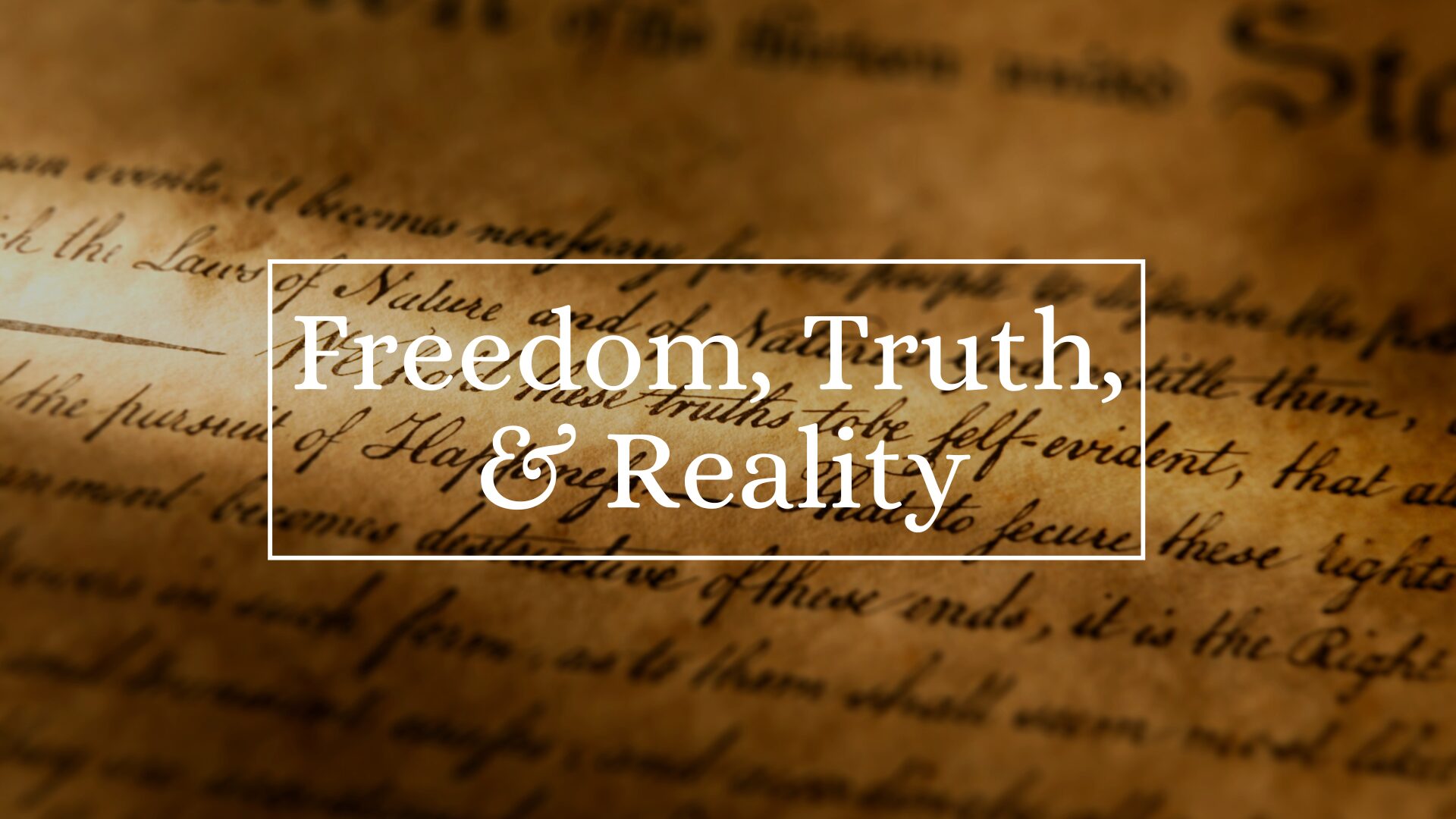Sermon by Rev. Craig Ross
This is a time of the year when we often think a lot about the word freedom, right?

Elections are a corporate event that virtually demands a pause in life. We can reflect on the blessings and privileges of freedom and what it offers to us in our country and how we might best embrace this blessing through our choice of leaders.
Change of seasons we experienced in these later months of the year also leads some to migrate to different parts of this magnificent globe because we have the freedom to travel, to embrace the rich diversity that our nation offers us. From sea to shining sea and beyond. Increasingly, individuals have the freedom to live their lives in ways that reflect the identity that they believe God has sewn into the very fabric of their lives and souls.
Freedom is one of the themes of today’s lesson from the gospel.
As Christians, we’re pretty comfortable defining the gospel of Jesus in a variety of ways, right? We all have our sort of mini gospels that we carry with us. We use words like salvation, maybe grace, maybe forgiveness, maybe life. If we took a bit of time this morning, we could add additional words that would describe this gospel as we experience it in our uniqueness, in our communal ways, and everywhere in between.
In our lesson today, we’re called to embrace one word. One word that might not always be on the tip of our tongues when we think about the gospel, and that’s this word, freedom. Today, Jesus adds freedom as another way to describe the gospel.
Think about it. The images we use to describe salvation typically assume some need that we have. One has to value salvation because one knows one needs saving. One to whom grace is important and is aware of the need for grace. Forgiveness implies sin, so you get the picture.
No wonder those who engage Jesus in our lesson today are offended. Because Jesus says to persons who already believe in him, “If you continue in my word, you are truly my disciples, and you will know the truth, and the truth will make you free” – John 8:31-32. The promise of freedom, awesome! Except it’s not. At least not to those whom Jesus makes this promise. They’re pretty much the opposite of excited or grateful for Jesus’ words as they offer their answer. “We are descendants of Abraham and we have never been slaves to anyone. What do you mean by saying you will be made free? – John 8:33.
No thank you, Jesus. No praise God, and definitely no awesome. Instead, those that Jesus addresses are offended. “What do you mean” is all they can offer in response to this teaching and this assurance. The modern way of saying that might be, who do you think you are anyway, Jesus, to talk like that?
Now we have the luxury of a couple of thousand years of reflection on this scripture. So to me it makes sense.
But it is a challenging encounter that Jesus offers us today because by offering them freedom, Jesus does imply that they are not free. And as is the case with most of us, we get backed up into a corner, we pull out our tried and our true responses that are usually pretty defensive responses. These Jews here do the same. We are descendants of Abraham. We have never been slaves to anyone, they say.
We’ll time out here for a moment. Admittedly, none of us here are Old Testament Bible scholars, including me. But we know the problem in this response, right? This problem is embedded in what the Jews say. Did the Jews somehow forget their slavery in Egypt? Or the Assyrian captivity? Or the Persians? Or any of those who have taken over Jewish life and enslaved them for periods in history. What about the Romans? They’re not exactly your friends here in first-century Judaism.
As the old saying goes, denial is not just a river in Egypt. But before we judge our first-century brothers and sisters in faith, shouldn’t we ask the question, aren’t we at some times just the same?
How good are we at naming and admitting our own needs, our own hurts, our own brokenness?
How comfortable are we in naming those things that enslave us as individuals, as families, and sometimes as churches? This enslaves us in the sense of honesty admitting that we’re not perfect, we have problems, and that we are enslaved by things. It’s hard to do, but Jesus’ presence and Jesus challenging us throughout his various teachings and stories and all those with whom he engages reminds us that through admitting our lives being imperfect, we have a little bit of breathing room, not just for growth improvement, but also for help.
Maybe big words like repentance and forgiveness. It’s not easy to do. It’s sort of my business and I’m not good at it all the time. I’m good at talking about it, really good at that, and advising other people about it. But, you know, in my friendship circles, in my family, in close connections I have with folks, I’m not too easy to own my bondedness to things that I don’t want to let go of.
Today, it seems for me at least, it’s harder than it used to be because there’s so much cultural pressure to act as if we have everything together.
Great life, great job, great relationships, great future, great Facebook and Instagram pages, great everything, right? There’s such pressure. Our lives to the point where they shine. And as we buy into that illusion, we contribute to our own bondage.
For a while social media platforms like Facebook, Instagram, and Twitter (Now X) have proven a great way to keep in touch with people we love and cherish, no question about that. But they also have proven to be vehicles that demand greater attention and effort and ultimately pretense as we try to convince the world that we’re living our ideal lives.
Maybe I should be a little better than they are. I can make that happen on social media. That pretense takes a toll, of course. We know that. We’re honest with ourselves. We don’t claim descendants from Abraham but by our acts and our loyalty to God. We might not claim descendants from Washington or Luther either. We might admire Elon Musk, Oprah Winfrey, or Beyonce. One way or another, we name them as our apostles. And then we cry out, or we should cry out, that we have never been slaves to anyone.
I don’t honestly know what a United Church of Christ community might do in this situation. Maybe look to James O’Kelly, Abner Jones, the former Baptist, or Barton W. Stone as the early formers and followers of the United Church of Christ movement. You might know more modern ones. Who is thinking closer to home? The Right Reverend Katherine Kuhn? We have persons we look up to, and we ask them to help guide us in deciding what makes us authentic, and what gives us a sense of purpose in our lives. But I don’t know those persons as well as many of you do.
So I’m going to go to the one that Lutherans know, Martin Luther, and his earliest seminal, and of his theology, the 95 Theses.
I can’t read much of Luther, it’s too long and gobbledygook, but I can understand the 95 Theses they’re short and they’re tight and I can remember even a few of them.
But the first of his 95 Theses is about repentance. When our Lord and Master Jesus Christ said, repent, he willed the entire life of believers to be one of repentance. In our softer and more gentle times, we’re not all that big on the word repentance. It’s pretty harsh, but I think our reticence around embracing repentance is that we might misunderstand what repentance really means. Luther says that when calling for repentance, he’s not talking about confession and penance as administered by clergy. Luther never saw repentance as an inward, cathartic, feel-good, or feel-bad kind of moment. For Luther, true repentance is a kind of truth-telling that allows you to be honest about how you are deceiving yourself or letting yourself be deceived by the world.
And that, Luther suggests, gives you an opportunity, a moment. To think, speak, and act differently. To put it another way, that gives you an opportunity to live in freedom.
Jesus’ invitation from freedom demands an act of repentance as truth-telling before it hits home and does that saving work for us.
Because it demands that we become clean about our needs, which isn’t easy for self-made women and self-made men to admit. Just as with Jesus, earlier conversation partners, the truth of which Jesus speaks is two truths. First, a truth about us, and then a truth about God’s response to us.
God’s news is that we’re always sinners, God’s fallen, and at times flailing around confusedly, always imperfect. And in the face of that fallen grace that characterizes our lives, God then chooses to love us anyway. Hope that divine love in time will change us, transform us, and redeem us.
Gloria Simon was known for repurposing an old Alcoholics Anonymous saying when she struggled in her life, she would say, “The truth will set you free, but first it will make you feel miserable.”
The truth with which Jesus confronts us, that we are sinners. God’s fallen, at times flailing, regularly confused, and always imperfect children from birth to death is true. But, and here is the second, I won’t say more important, but certainly equally important truth that does sound like good news, that we are also those sinners who are simultaneously God’s beloved children.
Those sinners who God calls blessed and holy and perfect. Those sinners whose futures are not determined by our regrets and our mistakes, but by the possibilities created by resurrection every day of our lives. Those sinners who God loves above anyone else. We are not perfect. We don’t have to be in order to be loved because only God is perfect.
We are granted the privilege of hanging on to God’s coattails until that day when we die and have the chance to see what it looks like up close and personal.
In closing, I offer a final word of David Lowes, one of our bright Lutheran voices of hope.
We are sinners. Sinners that no amount of indulgences, good works, intentions, status updates, or creative social media posts can redeem. But, here is the second truth which finally sounds like good news, we are also those sinners who are simultaneously God’s beloved children.
Those sinners who God calls blessed, holy, and perfect. Those sinners for whom Christ died. Those sinners who make mistakes but by the possibility created by resurrection, those sinners whom God loves above all else. We are not perfect, and we don’t have to be in order to be loved by God.



